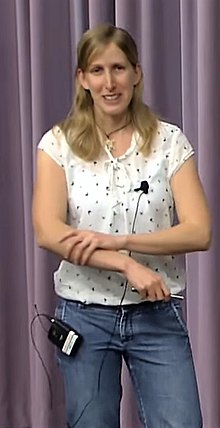Jennifer Dionne
Jennifer Dionne is an Associate Professor of Materials Science and Engineering at Stanford University and director of its TomKat Center for Sustainable Energy[1]. She is notable for her work on materials science and imaging. Her research focuses on the development of new optical materials and microscopy technologies to observe chemical and biological processes as they unfold with nanometer scale resolution. The results of her research help improve energy-relevant processes (such as photocatalysis and energy storage) and medical diagnostics and therapeutics.
Jennifer Anne Dionne | |
|---|---|
 Dionne lectures at Stanford in 2017 | |
| Citizenship | American |
| Alma mater |
|
| Scientific career | |
| Fields | Physics, Materials Science, Radiology |
| Institutions | Stanford University |
| Thesis | Flatland Photonics: Circumventing Diffraction with Planar Plasmonic Architectures (2009) |
| Doctoral advisor | Harry Atwater |
Biography
Dionne grew up in Rhode Island. She received bachelor's degrees in Physics and Systems Science and Engineering from Washington University in St. Louis in 2003. She then received master's and doctoral degrees in Applied Physics from Caltech in 2009, advised by Harry Atwater.[2]
She is currently Associate Professor of Materials Science and Engineering at Stanford University, and is also a professor of Radiology (by courtesy), affiliate faculty at the Wu Tsai Neuroscience Institute, and director of the TomKat Center for Sustainable Energy.[3]
Patents
Patents include:[4]
- Hearing aid output clipping apparatus
- Metal Oxide Si field effect plasmonic modulator
- Materials for parity-time symmetric electro-optical devices
- Quantum converting nanoparticles as optical electro field sensors
- Method and structure for plasmonic optical trapping of nanoscale particles
- Slot waveguide for color display
Awards
- MIT Technology Review Innovator under 35 (2011)[5]
- Oprah's 50 Things That Will Make You Say "Wow!" (2013)[6]
- Presidential Early Career Award for Scientists and Engineers (2014)[7]
- Sloan Research Fellowship (2015)[8]
- Dreyfus Teacher-Scholar Award (2015)[9]
- Adolph Lomb Medal (2016)[10]
- Moore Inventor's Fellow (2017)[11]
- NIH Director's New Innovator Award (2019)[12]
- Alan T. Waterman Award, National Science Foundation (2019)[13]
References
- "Jennifer Dionne's Profile". profiles.stanford.edu. Retrieved 2020-03-02.
- Sam Scott (May–June 2015). "The Improbable World of Jennifer Dionne". Stanford Magazine. ISSN 0745-3981.
- "The Dionne Group". dionne.stanford.edu. Retrieved 2019-12-28.
- "Search Patents - Justia Patents Search". patents.justia.com. Retrieved 2020-05-10.
- Bourzac, Katherine. "Innovator Under 35: Jennifer Dionne, 29". MIT Technology Review. Retrieved 2019-12-28.
- "50 Things That Will Make You Say "Wow!"". Oprah.com. Retrieved 2019-12-28.
- "President Obama Honors Outstanding Early-Career Scientists". whitehouse.gov. 2013-12-23. Retrieved 2019-12-28.
- Elaine Ray (2015-02-24). "Three Stanford scientists named Sloan Research Fellows". news.stanford.edu. Retrieved 2019-12-28.
- "The Dionne Group | Stanford University". dionne.stanford.edu. Retrieved 2020-05-10.
- "Adolph Lomb Medal". The Optical Society (OSA).
- Aditi Risbud (2018-01-03). "Beyond the Lab:Jennifer Dionne, Ph.D." Gordon and Betty Moore Foundation. Retrieved 2019-12-28.
- "NIH Director's New Innovator Award Recipients 2019 Awardees". commonfund.nih.gov. Retrieved 2019-12-28.
- "2019 Alan T. Waterman Awardees". nsf.gov. Retrieved 2019-12-28.